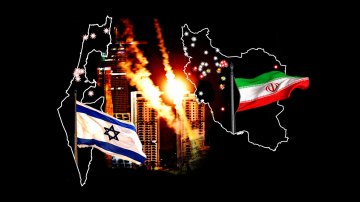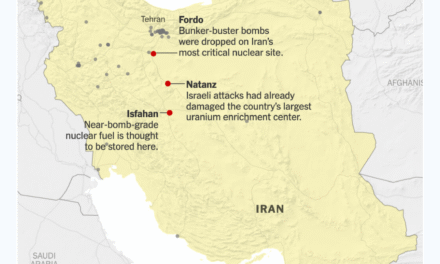Patrick Kingsley
The Ney Your Times
June 20, 2025, 11:43 a.m. ET
Iran sent a barrage of missiles into Israel on Friday that struck in several places, according to Israeli broadcasters and the country’s main emergency service. Two people were severely injured in the northern city of Haifa, the service’s director said in a television interview, and broadcast footage showed debris near one of the impact sites in central Haifa.
Both sides traded fire even as European ministers were meeting with Iran’s top diplomat in Switzerland to try to cool the week-old conflict. Abbas Araghchi, Iran’s foreign minister, said Tehran was not interested in negotiating an end to the war until Israel stopped its attacks.
A day after President Trump said he would put off a decision on whether to join Israel’s attacks for two weeks to give diplomacy a chance, Mr. Araghchi said in an interview with the Iranian state broadcaster IRIB that “we have clearly said that there is no room for talking until this aggression stops.”
Earlier, Israel announced overnight strikes on missile factories and a research center linked to Iran’s nuclear program. The country’s defense minister, Israel Katz, said he had ordered the Israeli military to increase its attacks on Iranian government targets to “destabilize the regime,” deter it from firing at Israel and displace the population of Tehran.
The Iranian missile barrage on Friday wounded at least 17 people, three of them seriously, according to Magen David Adom, Israel’s main emergency service. The Israeli fire and rescue service said it had dispatched teams to seven places in southern Israel where it had received reports that missiles or missile fragments had fallen.
In a demonstration after Friday Prayers in Tehran, thousands of people protested over the Israeli attacks, with some trampling or burning American and Israeli flags, video from the scene showed.
In the eighth day of the fighting, the war’s trajectory was uncertain. Mr. Trump walked back suggestions on Thursday that the United States was about to join Israel’s attacks, announcing a window of up to two weeks to reach a diplomatic solution.
That dashed Israeli hopes of a swift climax to the war. Israel seeks to destroy Iran’s nuclear enrichment program, and its leaders had hoped that Mr. Trump would soon send American bombers to destroy an underground enrichment site deemed largely impermeable to the kinds of munitions in Israel’s arsenal.
Now, Israel must decide whether to wait for U.S. military support or use its own, less powerful missiles to attack the site.
The talks in Geneva on Friday are aimed at reaching a third option: a grand diplomatic compromise in which Iran would agree to enough limits on its nuclear program to satisfy Israel. Mr. Araghchi was meeting with his counterparts from Britain, France and Germany, as well as the European Union’s top diplomat.
In the interview on Friday, Mr. Araghchi said his country would not talk to the United States, calling it “a partner in this crime.” But he said he was willing to hear what the European officials had to say.
Here is what else to know.
New attacks: Iran’s state broadcaster reported that Israeli strikes had targeted an industrial complex in the Sefid-Rud area in the northern provinces along the coast of the Caspian Sea. There were also large explosions in the city of Rasht in the north and in the Lavizan countryside, north of Tehran, suggesting a geographical expansion of Israel’s targets.
Paths ahead: If Mr. Trump decides to send American bombers to help Israel destroy a uranium enrichment facility in Iran, it will likely initiate a more dangerous phase in the war. Here are some ways that could play out.


